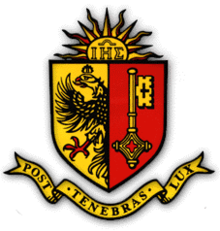3 November 2013 — 10 AM Worship
| Scripture: | 1 Samuel 7 |
| Sermon: | 
“Post Tenebras Lux” |
| The Lord’s Supper | |
| Hymns: | TH 7 — “From All That Dwell Below the Skies” |
| TH 161 — “O Christ, Our Hope, Our Heart’s Desire” | |
| TH 457 — “Come, Thou Fount of Every Blessing” | |
| Doxology: | TH 734 — “Gloria Patri” |
3 November 2013 — 3 PM Worship
| Larger Catechism #84 (paraphrased into modern English) | Shall all people die? |
| Since God threatened death as the wages of sin, it is appointed unto all people once to die; because all have sinned. |
|
| Shorter Catechism #37 (paraphrased into modern English) | What blessings does Christ give believers at death? |
| At our death as believers, Christ makes our souls perfect in holiness and immediately welcomes us into glory; while our bodies, being still united to Christ, rest in our graves until the resurrection. |
|
| Scripture: | Luke 16:19–31 |
| Sermon: | “Two Men Died” |
| Hymns: | TH 309 — “Rejoice, the Lord is King!” |
| TH 334 — “Breathe on Me, Breath of God” | |
| TH 314 — Psalm 2 | |
| Doxology: | TH 650 (stanza 3) — “I Will Praise My Dear Redeemer” |